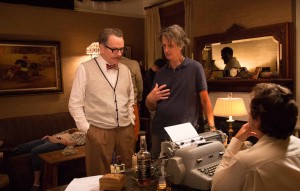
In the light of recent events and congressional investigations, director Jay Roach (Game Change, Recount, Meet the Fockers) believes the historical story is relevant now, “For me, it is a film about today. We just happen to be using another period not so long ago to talk about today. It’s about how we allow a fear-based messaging system to take over our lives and convince us to give up freedom of speech, to let our privacy be invaded, to succumb to certain kinds of searches.”
The current climate of fear brought on by the terrorism of 9/11 can be paralleled to the fear of totalitarianism prevalent after World War II. Roach hopes that the film prompts people to ask questions about how they are being manipulated. Is fear being inflated or distorted to the point that people turn on each other like they did during the communist scare chronicled in Trumbo?
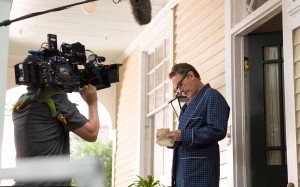 “To imagine writers, directors, actors turning on each other and trying to destroy each others’ lives and end their careers, it’s astonishing,” commented Roach. “It’s not that different from people calling the main stream media, the ‘lame stream media’ because it’s supposedly infested with liberals. It’s part of the myth. There is always a little kernel of truth so people buy it. And there’s fear. It’s the propagandist’s cookbook. The same ingredients get thrown in throughout history: fear, envy, emotions you can tap into to get people to do things that really are not in their own interest.”
“To imagine writers, directors, actors turning on each other and trying to destroy each others’ lives and end their careers, it’s astonishing,” commented Roach. “It’s not that different from people calling the main stream media, the ‘lame stream media’ because it’s supposedly infested with liberals. It’s part of the myth. There is always a little kernel of truth so people buy it. And there’s fear. It’s the propagandist’s cookbook. The same ingredients get thrown in throughout history: fear, envy, emotions you can tap into to get people to do things that really are not in their own interest.”
If there is a common theme in the dramatic films that Roach has directed, and even in some of the comedies, it has been about “how spin can make a bad idea seem like a good idea and therefore become more contagious. Or how spin can make a good idea seem like a bad idea, which is even more contagious because negative ideas travel even faster than positive ones.”
Exploring the themes in Trumbo’s writings was an interesting part of Roach’s preparation for directing the film. According to Roach, the screenplays contained many humanistic themes focusing on how people could be better to each other. Although themes connected to class reoccur throughout the work, they were not communist manifestos.
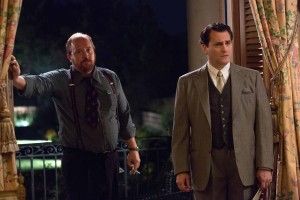 “I think he was a humanist. He himself said he joined the communist party because there were no other good reactions to fascism. There were no good reactions to the kind of runaway capitalism that caused the great depression. He was much more closely aligned to what you would call liberal politics today,” explained Roach. “He was interested in workers rights, civil rights, freedom of speech, things that any liberal would espouse today.”
“I think he was a humanist. He himself said he joined the communist party because there were no other good reactions to fascism. There were no good reactions to the kind of runaway capitalism that caused the great depression. He was much more closely aligned to what you would call liberal politics today,” explained Roach. “He was interested in workers rights, civil rights, freedom of speech, things that any liberal would espouse today.”
Roach noted that Trumbo was a preachy guy, and he was too preachy for his own good. He drew attention to himself, making himself a target for the righteous crusaders of his day. In the film fellow writer Arlen Hird, played by Louis C.K., even asks Trumbo, “Does everything you say have to sound like it can be chiseled into a rock?”
For a film that tackles serious issues, it might seem incongruous to cast a known comedian like Louis C.K., but the subject matter is rendered much more accessible by the infusion of humor.
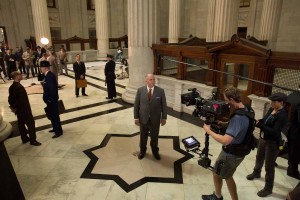 “I went for a cast that could handle wit, and irony, and in some cases, full-on comedy,” said Roach. “Although it is a very serious topic, and people suffered horrifically and sacrificed so much, they were pranksters too. They were funny. They would roast each other. His friends roasted him at his funeral. That’s the kind of guys they were.”
“I went for a cast that could handle wit, and irony, and in some cases, full-on comedy,” said Roach. “Although it is a very serious topic, and people suffered horrifically and sacrificed so much, they were pranksters too. They were funny. They would roast each other. His friends roasted him at his funeral. That’s the kind of guys they were.”
Casting director, David Rubin, was tasked with assembling the versatile performers for the film. He has cast every one of the director’s dramas and all three of Roach’s HBO films, including the new LBJ movie, All the Way. The casting for Trumbo was one of the most difficult casting assignments because they had to cast people who could plausibly play John Wayne, Kirk Douglas and other well-known Hollywood celebrities.
“He is my secret weapon,” admitted Roach. “David Rubin has such great taste and brings me incredible ideas for every role. I said, ‘David, if I can’t get a great John Wayne, I don’t know how to make this movie. He’s a big part of the forces aligned against Trumbo. If he’s laughable in any way, we’re dead.’ He totally got it.”
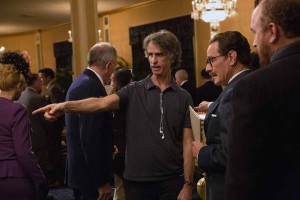 Rubin and Roach started scouring tapes and shows. Rubin found Dean O’Gorman, the guy who played Kirk Douglas, in Australia. They first had to audition him via videotape, trading notes with the actor as he worked on the accent and “vibe of Kirk Douglas” until finally Roach was sold.
Rubin and Roach started scouring tapes and shows. Rubin found Dean O’Gorman, the guy who played Kirk Douglas, in Australia. They first had to audition him via videotape, trading notes with the actor as he worked on the accent and “vibe of Kirk Douglas” until finally Roach was sold.
Cinematographer, Jim Denault and Roach have worked on six films together. “He’s a rare bird. He is so fast and so good and also incredibly collaborative,” said Roach. “We were joking about it last night. I was remembering shot after shot. I remembered us having healthy discussions, and in some cases debates, about how it should go. Out of our discussions a third new way would come up that neither of us thought of and it worked.”
Denault is a performance-friendly cinematographer. He takes enough time to make sure the frame looks great, but because he is so fast, Roach is able to do a lot of takes. The day is not consumed by tweaking lights, but rather given to performance. The cinematographer is extremely prepared, but he also allows for improvising by the actors. They come in with a plan A and a plan B, but are also ready for plans C, D, E and F.
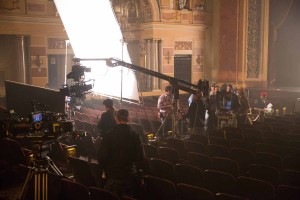 “We honor the rehearsals. First of all we don’t come in with it all preordained and storyboarded and shot listed,” revealed Roach. “I have the cast come in and rehearse with Jim watching before we ever show the crew what’s going on. We figure out what the story and performers need. Then we figure out how to light it and shoot it.”
“We honor the rehearsals. First of all we don’t come in with it all preordained and storyboarded and shot listed,” revealed Roach. “I have the cast come in and rehearse with Jim watching before we ever show the crew what’s going on. We figure out what the story and performers need. Then we figure out how to light it and shoot it.”
Production designer Mark Ricker and costume designer, Daniel Orlandi help the director and actors to build the world and characters. Roach has worked with Ricker on both Trumbo and the LBJ project and collaborated with Orlandi since Meet the Parents.
“What I tell my crew is, help me understand what the character is about, what the movie’s about, and what’s at stake, what matters in the whole movie and scene by scene. Focus on what matters and have every decision come out of that. What does this character care about? What are they afraid of?” explained Roach. “For them, it’s ‘Let’s tell the best story.’ All the great crew that I have been able to work with come at it from story first.”
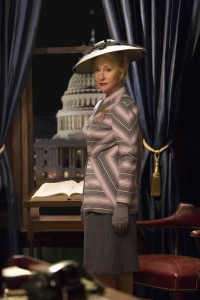
Roach started working with editor Alan Baumgarten years ago on a television show called Space Rangers. He described the editor as talented and speedy and capable of directing himself. One of the rare attributes that Baumgarten possesses is a taste in performance that jells with that of the director.
“He is so good that I don’t have to go in and look for alternate takes,” stated Roach. “I used to do that all the time. I’d go and search for all the takes that I thought he might be missing. I realized I was wasting my time. Almost always, I would pick the exact same take. To have someone who has that taste for performance as your editor is a gift.”
Roach strongly relates to his crew because at one time or another he has worked in various crew positions from camera to editing. He concluded, “I am just a crew member who can direct.”





